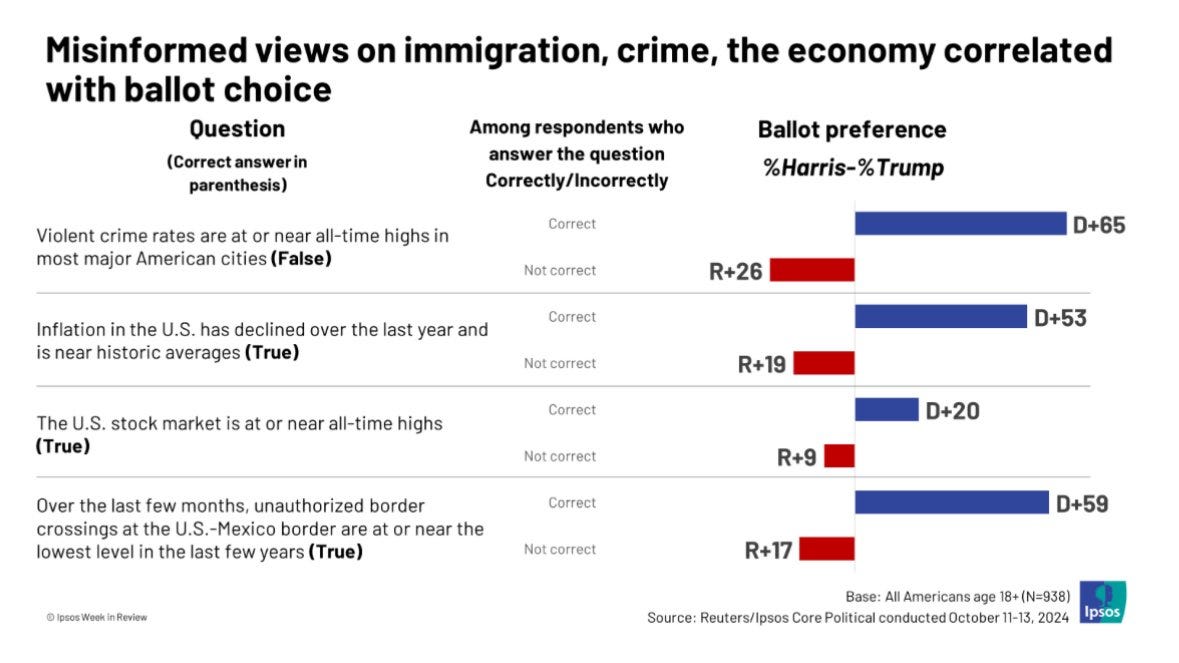Are Trump Voters Misinformed, Or Were Harris Voters Just Not Given A Chance To Be Misinformed?
On unbalanced surveys
There’s a chart being passed around with much smugness and exasperation by folks who are upset Trump got elected.
It’s titled “Misinformed views on immigration, crime, the economy correlated with ballot choice,” and It’s drawn from Ipsos Core Political data generated during October surveys:
The chart shows that on four questions having to do with crime, the economy, and immigration, voters preferring Kamala Harris answered far more accurately than voters preferring Donald Trump. Therefore, the thinking goes, Trump voters are misinformed.
One characteristic response: “I hate to put a lot of highly paid pundits out of business, but look at this f**king graph,” tweeted Dean Baker, a senior economist at the Center for Economic and Policy Research, a progressive think tank. If Trump voters are this incorrigibly misinformed, what is to be done?
Another theory: The American public, myself included, is not generally well-informed on the specifics of policy issues. Oftentimes, when we’re faced with these sorts of questions, we use heuristics to answer. Partisans, who are probably more likely to answer questions like these, are also probably more likely to use a heuristic than to just say “I don’t know” and/or not answer the question. And if Ipsos Core Political had chosen different questions, they could have just as easily “proven” that Harris voters are less informed than Trump voters.
Back in 2018 I wrote an article for New York magazine’s website arguing that a lot of social science trying to “understand” conservatives was beset by bias and deck-stacking:
Imagine you and I are out for drinks at a bar. A couple beers in, apropos of nothing, I announce to you, “You know, liberals are way more authoritarian than conservatives.” “No way,” you respond. “Way,” I say, confidently. I pull a sheet of paper from my shirt pocket and slide it to you. “This is my Jesse Singal Authoritarianism Scale, or JSAS for short,” I tell you. “I had 500 people take this short scale and liberals scored way higher than conservatives.”
You look down at the scale and it reads:
For each of the following items, please indicate your level of agreement, from 1 (disagree completely) to 7 (agree completely), with a score of 4 indicating neither agreement nor disagreement.
1. In certain cases, it might be acceptable to curtail people’s constitutional rights in order to stop them from spreading climate-change denialism.
2. The government needs to do a much more comprehensive job monitoring Christian-oriented far-right terrorism.
3. Some people want to act like the causes of racism are complicated, but they aren’t: Racists are moral failures, and that’s that.
If you’re a thoughtful reader, you will, of course, find my claim ludicrous. By dint of the subject matter of my questions the test is basically built to “discover” that liberals are more authoritarian than conservatives. All my questions are rigged in a manner that will, in almost all likelihood, cause political liberals to score more highly than political conservatives on the scale, thus spitting out the “finding” that liberals are more authoritarian.
The above, fictional questionnaire is an extreme example, but a growing insurgency within social and political psychology has begun to argue, credibly, that a version of this has been going on for decades — only the other way around. Liberal psych researchers, centering their work on liberal values and political opinions, have built up a body of knowledge that is fundamentally flawed and biased. As a result, certain false ideas about conservatives and how they differ from liberals may have taken hold.
I’m not going to rehash this entire argument here — you can read the piece if you like (it’s paywalled but shhhhhh) — but I think the core point is pretty hard to dispute: If you’re going to attempt to evaluate which “side” of a political debate is more informed, or more authoritarian, or more tolerant, you need to be very careful about whether your questions are balanced. If they aren’t, you might generate artifacts.
So: It’s October 2024. An election is coming up. You’re asked a question about crime. If you’re a Republican, you’ve seen a lot of scenes of urban chaos and “know” that crime is super high right now. If you’re a Democrat, you “know” that a big part of Republican campaigning has been scaremongering about super-high crime rates. If you’re neither, you might answer based on vibes, and your vibes are themselves mediated by your social network, information sources, and so on. In any case, you answer accordingly, using a heuristic of some sort, whether or not you know the statistical specifics. This is how people reason a lot of the time, because most people — again, myself included — do not closely track national statistics on this or that.
As it turns out, we’re very far from the all-time violent crime rate, and it would take a yearslong bloodbath to get us there. Ha-ha-ha, dumb conservatives!
Except: Questions about immigration and crime are much more morally and emotionally kinetic to conservatives than liberals, on average. I would wager a large amount that if Ipsos had asked questions about subjects more arousing to liberals, they could have easily produced a graph showing that liberals are less informed.
I can say this with some confidence because on those rare occasions when social scientists have attempted to address this “bug” in their work, it has turned out that if you phrase questions differently, in a manner that tickles liberal moral intuitions, you can “prove” that liberals are more authoritarian, dogmatic, ill-informed, and so on.
Skeptic did a clever version of this back in 2021, asking a sample of Americans how many unarmed black men had been shot by police in 2019. This was, at the time, perhaps the most emotionally arousing issue for liberals. (Before you read further, see if you know the approximate answer off the top of your head.)
Keep reading with a 7-day free trial
Subscribe to Singal-Minded to keep reading this post and get 7 days of free access to the full post archives.



